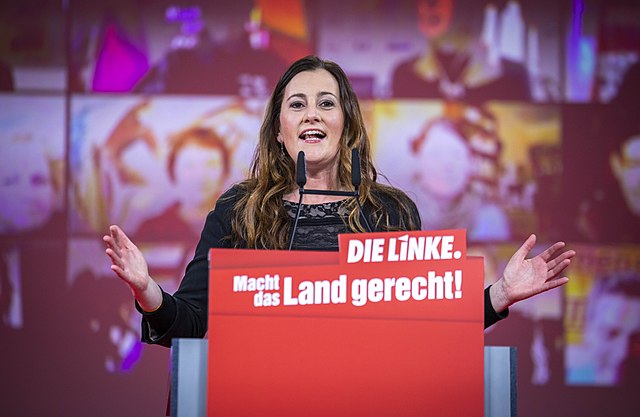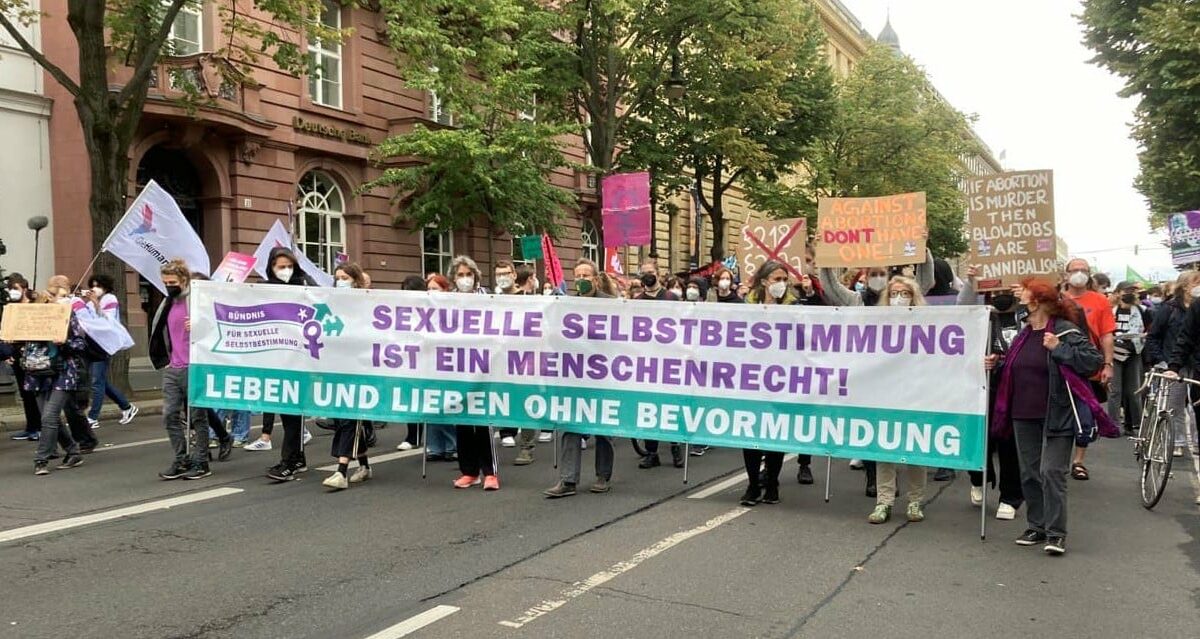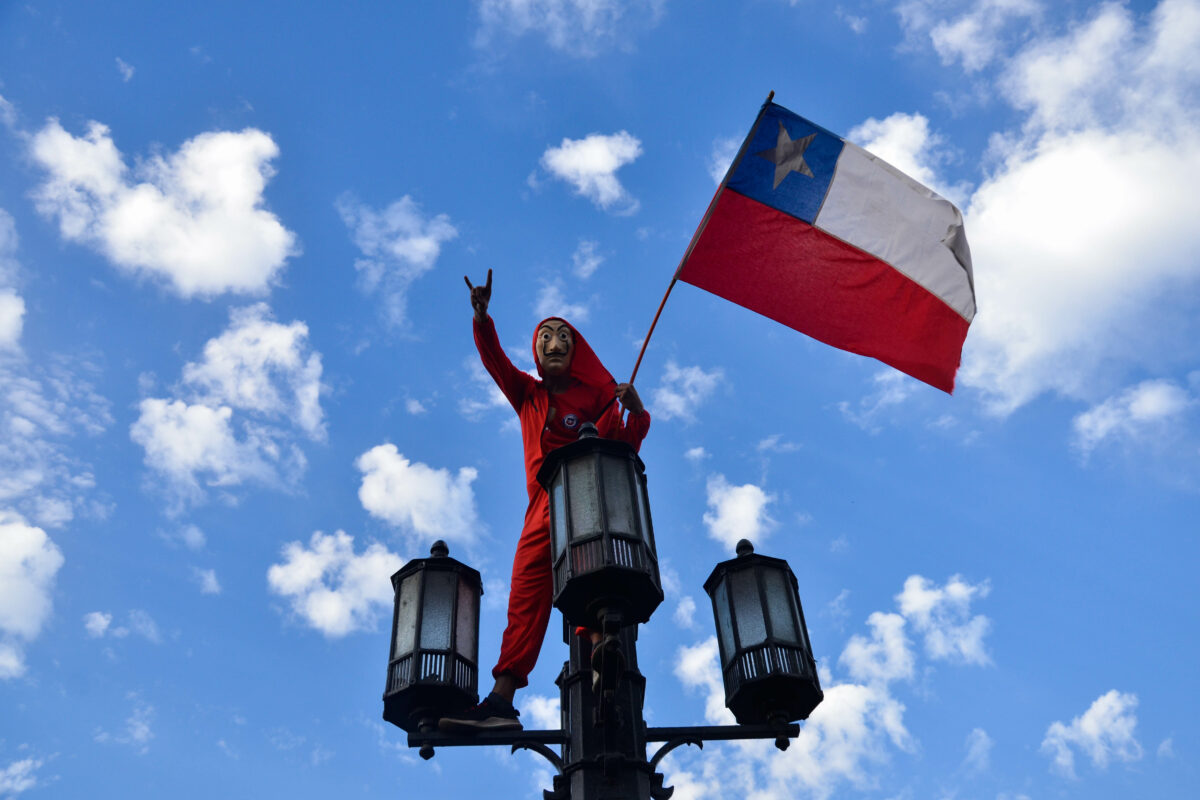Dear readers, friends and relatives,
Plenty has been happening in Germany these past months, in Berlin most especially. And where were the BERLIN BULLETINS or, more exactly, where was their author? The answer is simple. Like Germany and most of the world, I got hit by Corvid (despite two vaccinations). I was ill for four weeks, three in the hospital (one in Intensive Care). Now recuperating at home (with a tube pumping oxygen into my nostrils), I have finally gathered up enough energy to get them going again. (But Germany is still in an epidemic mess, with rules changing every day, and protests continuing!)
++++
After the German elections on September 26th it took, as usual, weeks and weeks for the three coalition parties to agree: On one program, full of compromises, pledges and promises (some of which may even been be kept) and to resolve quarrels over who gets which cabinet seat. The answer to that old question, “Who’s on first?” was clear – Olaf Scholz, the Social Democrat (SPD), became chancellor, after sixteen years with Merkel. Finally, on Dec. 8th, he and 16 cabinet ministers were sworn in. Nine pious ones added an appeal to the divinity, “so help me God!” while the five Green ministers and three of the six Social Democrats (including Scholz) decided to risk the job without His Assistance.
Pious or not, they were faced by the old truism, “Two’s company, three’s a crowd!” The SPD still calls itself “left” and tries somehow to appeal to workers, or at least union leaders. The Greens, once the party of rebelliousness, still stand for women’s rights, gay rights in all variations, opposing neo-Nazis and far-right xenophobia. But they have grown tamer and tamer. While still playing their basic environment-ecology card they often cozy up to monopolies who like to talk green but always think first of their bank accounts. In southern Baden-Württemberg, the Greens’ one and only state governor gets along fine with Daimler-Benz, the giant which is centered there. In Hesse, as junior coalition partners of the Christian Democrats (CDU), they have had no known run-ins with the bank interests centered in Frankfurt/Main. All the same, the media still classifies those two as “left” – or at least “center-left”.
But that third Free Democratic Party (FDP) is unabashedly right-wing pro-capitalist, at least in all economic matters. Despite the fewest popular votes of the three its’ good-looking, well-spoken one-man boss, Christian Lindner, has a loud voice. It is he who grabbed the powerful job of Finance Minister and has taken a no-compromise stand against raising taxes on the super-rich (using the same leak-down arguments as in the USA since Reagan). While SPD and Greens have ties with the monopolies, they occasionally move them to make limited concessions. Like raising minimum wages, some aid to children and a few more euros to the jobless. But Lindner and his FDP belong outright to the ‘biggies’. Whether the pandemic wanes or worsens: working people, the jobless, the elderly, and several millions with precarious, temp, gig, part-time and unprotected jobs will all have to exert strong pressure “from below” to hinder further stagnation or worse.
Even more disturbing – or alarming – is foreign policy. The media contains constant, often daily warnings about Russian plans for aggression against the Ukraine. The so-called Very High Readiness Joint Task Force has cut the time allotted for going into action from seven to five days. What was lacking, however, was any evidence of anything else but the stationing of Russia’s forces within its own borders, while the military forces of fifteen NATO countries, including the USA, Germany and Britain, conduct annual maneuvers – far from their homes but all along Russian boundaries.
Sevim Dagdelen, the most militant deputy of The Left in the Bundestag, used the question time to ask what the basis was for the frightening build-up. The official answer was: “In this exceptional case, security requirements “ which made it impossible to give her an answer. Video films on TV of Russian tanks sitting near the Ukrainian border show no activity at all but are used over and over, obviously for lack of anything more convincing. The media’s blood-thirstiest warrior, the Springer Company “Das Bild,” printed a map with arrows showing Russian strategy plans. But – oh dear – the name given Lviv (or Russian Lvov) was Lemberg, not used since 1945; they seem to have used an old Nazi-era map (or older). (Note: The far-right Springer Co. now owns the news agency Politico, which seems to be just as alarmist.)
And who is now in charge of German foreign policy? It is Annalena Baerbock, the Greens party leader and always among the loudest in belligerent, bellicose statements against Russia, and now China too.
German foreign policy has long been divided between: First the “Atlanticist” position – all for armaments and maneuvers along Russian borders and in the South China Sea, the more the better; and second the commercial position, reflecting the need for trade with Russia and even more with China, its main trading partner. Merkel was caught in the middle. Some in the SPD may also prefer trade and diplomacy to belligerence or war. The Green leaders (though not all of their grass roots membership) are avid Atlanticists. Baerbock made that clear: “We stand by our responsibility within the framework of NATO and the EU and also for nuclear participation… We have to procure the successor system for the (A-bomb-carrying, VG) Tornado because the conventional capabilities have to be replaced.”
Although a majority of Germans want no military action, the peace movement, though valiant, is still far too weak and splintered, and currently even side-lined by weekly protest marches by the corvid-downplaying anti-vaxing crowd, which includes both leftists as well as far-rightists.
And what about The Left?
The disastrous results of the September election (4.9%) have been blamed on all sorts of things, often on the left wing of the party’s stress on opposing NATO and deploying of German soldiers abroad. But far more convincing is the charge that the major mistake was the dream of many party leaders of becoming the third party in a coalition with the SPD and Greens. This led them to resolutely attack the Christian Democrats (CDU), who were never their rivals for votes. This would ‘spare the rod’ with the Greens and SPD – in hopes of being accepted by them as partners in a new government. But this did not hurt the CDU at all; if anything it brought them votes which might have gone to The Left. In the election, the Christians lost and so did The Left. The latter had sadly neglected its two major playing cards: the militant spokesperson for working people, the jobless and poorly paid – and the only genuine party for peace. With the collapse of the war in Afghanistan it passed up the opportunity to loudly recall: “Only WE, alone, opposed that war from the start!” and “We must never again engage in a NATO war or any foreign war!”
Even more basic, just one major candidate of The Left, co-chairwoman Janine Wissler, hesitantly attacked the whole billionaire-led system. It’s a daring stand, risky, but gaining ground. If matched by a genuine street-for-street fight for people’s rights it can have surprising results; a Communist woman recently won out as mayor in Austria’s second city, Graz.
The city-state Berlin also had elections on September 26th. For five years it has been ruled by that very same SPD-Greens-The Left coalition which some in The Left dreamt of achieving on a national scale. In vain! But in Berlin – Germany’s capital and biggest city – the state election results made it logical, arithmetically, to renew that coalition for five more years and avoid upsetting the applecart.
Then how could anyone favour breaking up this ruling trinity? There were some possible reasons. The five past years in government had cost The Left votes: it had dropped from third place in 2016 (with 15.6%) to fourth place, (with 14.1%) now behind the Greens, and lost its traditional first place in three East Berlin boroughs. Almost every time The Left manages to join a government coalition it loses votes in the following election. For protest voters it has become part of the Establishment.
Now, as the weakest partner, it lost its key cabinet post, Housing – after a disappointing (because greatly obstructed) record in building new apartment houses.
But the over-riding issue was the amazing initiative demanding the “confiscation” (though paying for it at market prices) of all housing owned by the seven companies with over 3000 apartments. In especial ‘Deutsche Wohnen’, which owns 243,000 of Berlin’s 1.5 million apartments. Members of The Left had outdone themselves to get this initiative on the ballot, collecting 350,000 signatures. Meanwhile its coalition partner the SPD opposed it and the Greens waffled and dragged their feet. This was the biggest truly fighting step The Linke has ever taken.
All Germany was amazed when over a million Berliners voted a resounding “Ja” – 59.1% (to 40.9% voting “Nein.”)! People everywhere, hit hard by rapidly rising rents and fearful of being forced out of their homes (and in Germany a majority live in rented apartments), hoped the move might spread beyond Berlin. The real estate giants, nearly all foreign-controlled, feared cuts in their big profits and grand gentrification plans and had exerted every possible form of pressure – but lost!
However, the vote is only a requirement to put the matter on the agenda of the Berlin legislature, not to enforce action. And that means trouble, most clearly in the form of Berlin’s new mayor. Franziska Giffey of the SPD, young, attractive, popular, once a borough mayor in West Berlin, then a cabinet minister in the national government. But only until it was “unearthed” that, in 205 pages of her doctorate dissertation, plagiarism was evident in 76 of them! Goodbye to her degree, goodbye to her national cabinet seat! Amazingly, she then landed on her feet back in Berlin, where her SPD got the most votes and she became its first woman mayor! And Giffey, like her party, rejects confiscation. Her plagiarism could be publicly proved – but her (and the SPD’s) ties to real estate interests could not.
Should The Left buckle , and accept her flouting of over a million Ja voters and join again in the city government? Yes, said right-leaning party leaders, who wangled a “compromise”. This is a three-party commission plus experts to “study the legal and financial questions involved in confiscation” – for a year of deliberation and report conclusions after which further measures could be taken. It was clear to everyone what this meant: Side-track it until enthusiasm and activity had subsided, then fully dilute or quietly bury it, i.e. postpone it to “Sankt-Nimmerleinstag” (“St. Neverman’s Day”).
In addition, the Left would lose the important Housing department. Instead it gets the departments of Culture, Social Services and Justice (largely about the prisons). All are important, but none are crucial or can win back many voters. In a first debate on the question of maintaining a status quo, 40% were opposed. But in a write-in vote of the entire membership, three-quarters of those who took part favoured staying in the ruling coalition. And so it will be.
Such differences at the state level reflect the worrying condition of the whole party. It is divided, partly due to some East West differences, but also to personal animosities, often paired closely with political views. Two one-time stalwart militants, Sahra Wagenknecht and her husband Oskar Lafontaine, a major party founder, have zig-zagged enough to move them to the party periphery. There has still not been any open debate as to why the party lost so disastrously in September, and what meaningful consequences – even painful personal ones – that requires.
A basic question remains: Will the party continue urging reforms and votes against arms sales and military deployment abroad, but playing down any basic condemnation of NATO and Pentagon‘s dangerous belligerency and unceasing push on all continents for world hegemony? All while equating this with Putin’s attempts at self-defense of Russia? Will it join the crowd in a continuing disparagement of the GDR, really aimed against socialism in general? Or will it take militant positions, opposing billionaires, from Krupp or Lockheed-Martin to Amazon and Facebook, Daimler and Bayer-Monsanto, keeping in mind the eventual need to send them off to the moon, to Mars or wherever? That would require The Left’s support for strikes, for those evicted, for all laid-off and underpaid working people. Not only in the Bundestag or state legislatures but at direct ground-level, primarily in the workshops, job centers, offices, universities – encouraging people to have a goal, for which they can fight together, march together, picket together and also sing together.
The next big meeting of The Left, probably only viral, is planned for February. Perhaps new methods and directions can gain ground – and save the sagging party before it is too late!
*
In closing, I hope for a genuine improvement of Russian-American relations, not just a photo-op.
And, also because my illness prevented me from sending any individual greetings, I send my personal greetings to all readers, relatives and friends with the hopes for a healthier, happier and more peaceful 2022. My own escape from fatal epidemic clutches strengthens the words, “Where there’s life there’s hope!”
So – Happy New Year!




